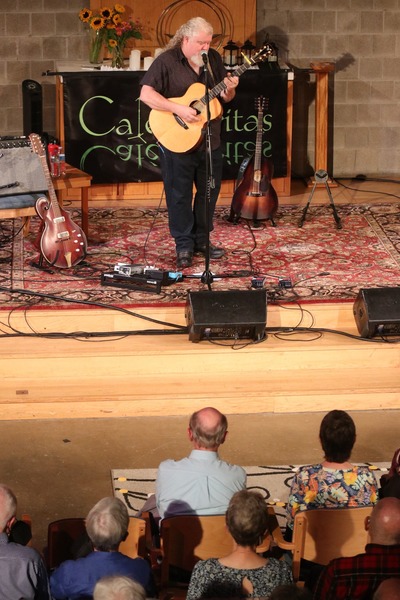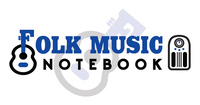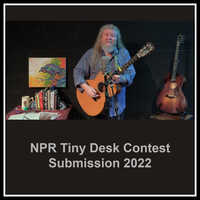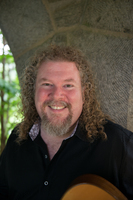Dear Friends,
I am writing to you while sitting in the mechanic’s shop. Here for an oil change. Just crossed over 345,000 miles on my 2014 Toyota Camry. I bought it with 57 miles on it. And 25 of those miles I put on while thoroughly test-driving the vehicle. It has been good to me, and I do my best to be good to it. I’ve asked a few mechanics about replacing it, about safety concerns, etc. To a one they’ve all said, “That car? Just keep changing the oil and it will keep going.”
I will. I do. His name (the Camry) is William. Sir William in formal settings. I don’t know why. It just is. All my cars have had names. Goldie, Bessie, Ella, Frank, Charles, and more. The things we ponder while driving long miles.
To wit, I have some marvelous performances coming up in the next few weeks in Pennsylvania, New Jersey, New York, Minnesota, and Ontaio. Full concert listings can be found at: https://www.joejencks.com/calendar
11-1-24 ~ Joe Jencks in concert at Godfrey Daniels ~ Bethlehem, PA
(Special guest opener - Sarah Murdoch)
11-2-24 ~ Joe Jencks in concert at The Cooperage ~ Honesdale, PA
11-3-24 ~ Joe Jencks in concert at WorldWind House Concerts ~Lawrenceville, NJ
11-10-24 ~ Joe Jencks in Concert at Golden Valley Folk House ~ Golden Valley, MN
11-16-24 ~ TrueSongs / Caffe Lena @ SPA Little Theater ~ Saratoga Springs, NY
(w/ Ellis Paul, Mark Erelli, Judy Kass, Hayley Reardon & Carolyn Shapiro)
11-17-24 ~ Joe Jencks in Concert at The Cuckoo’s Nest ~ London, ON
Please also read the essay below: On a Civil Society.
Thanks for the support and encouragement, and for coming out to concerts. Live music is the best. My heart is so full from the amazing events I have been a part of in the last several weeks, including Celebrations of Life, Festivals, and The Folk Alliance Region Midwest (FARM) conference. A heart full of community and a head full of music is a strong way to be present in the world, in the face of the unknowable future.
As the brits always say, Keep Calm and Carry On!
In Gratitude & Song,
~ Joe Jencks
Essay: On a Civil Society
Copyright 2024, Joe Jencks
The 2nd Continental Congress met on July 4th 1776 to sign the Declaration of Independence, severing ties with England and declaring sovereignty for the 13 colonies that now are part of the United States. In 1781, the Articles of Confederation were signed. In 1783, The Treaty of Paris officially acknowledged a cessation of overt hostilities and observed full independence of the United States as new nation with internationally recognized borders and sovereign rights.
But it was not until 1788 that we had a Constitution that was ratified, and it was not adopted by the 13 colonies as the defining and binding agreement that brought those colonies together into full nationhood until 1789. It was a process. It took time. It took thought. It took trial and error. It took persistence and intelligence, creativity, and painstaking patience to arrive at consensus. It was and remains an imperfect document and guiding set of ideals, ideas, and principals. And the framers of that constitution knew that future generations would need to change that document from time to time to address concerns of the times.
From the U.S. National Archives:
“James Madison, once the most vocal opponent of the Bill of Rights, introduced a list of amendments to the Constitution on June 8, 1789, and “hounded his colleagues relentlessly” to secure its passage. Madison had come to appreciate the importance voters attached to these protections, the role that enshrining them in the Constitution could have in educating people about their rights, and the chance that adding them might prevent its opponents from making more drastic changes to it.
The House passed a joint resolution containing 17 amendments based on Madison’s proposal. The Senate changed the joint resolution to consist of 12 amendments. A joint House and Senate Conference Committee settled remaining disagreements in September. On October 2, 1789, President Washington sent copies of the 12 amendments adopted by Congress to the states. By December 15, 1791, three-fourths of the states had ratified 10 of these, now known as the “Bill of Rights.”
Why does this matter? Why am I writing to you about this today? Because I really want to remind all of us that progress is more often than not incremental. The Buddhists say, “Before enlightenment, laundry. After enlightenment, laundry.” And so it is with our current political climate. Before elections, laundry. After elections, laundry.
But I also want to say that one of the compromises in the Constitution and its initial amendments was Article 1, section 2, clause 3, commonly referred to as the Three-Fifths Clause. It has created a real mess in our nation's history. And even now we are still subject to aspects of its ripple affect forward through time.
A PBS report from a few years ago said:
“Although the Constitution did not refer directly to slaves, it did not ignore them entirely. Article one, section two of the Constitution of the United States declared that any person who was not free would be counted as three-fifths of a free individual for the purposes of determining congressional representation. The "Three-Fifths Clause" thus increased the political power of slaveholding states. It did not, however, make any attempt to ensure that the interests of slaves would be represented in the government.”
Harvard Law School says:
“The Three-Fifths Compromise was reached among state delegates during the 1787 Constitutional Convention. It determined that three out of every five slaves were counted when determining a state’s total population for legislative representation and taxation. Before the Civil War, the Three-Fifths Compromise gave a disproportionate representation of slave states in the House of Representatives."
Aside from being profoundly unjust, this is also why the Electoral College exists. It was part of the haggling that led to the ratification of the U.S. Constitution and the acceptance of first 10 Amendments - known as The Bill of Rights. These are essential enumerations of the rights of people who had been subject to the rule of laws that were not entirely applicable to a new nation. But the Bill of Rights is not the end of the story. That’s why we have 27 Amendments now - and will likely see more in the future.
Nonetheless, nearly the entire reason that the Electoral College system initially existed was to balance political weight on the backs of persons enslaved, in states where slavery was legal, thus giving such states more power. And yet, those persons being counted had no actual representation.
Consecutive amendments were passed ending slavery as a legal institution, and acknowledging the rights of men of color to vote (Jim Crow laws notwithstanding) and eventually the rights of women of all races to vote. But the system is outdated and does not reflect the will of the people. Because even though the 3/5ths clause was superseded in practice by consecutive constitutional changes, the Electoral College remains. And, It still gives disproportionate power to a minority of Americans who continue to hold sway over our governance. I believe this is a system that needs to be amended, and replaced with a voting system where every legal voter gets one vote, and these votes are tallied nationally, not just the current winner-take-all, state-by-state system (save for Nebraska and Maine). It is only one facet of civil society. But I think it matters. It helps us move other things forward if we can get this piece figured out.
We will vote how we will. You will vote your conscience, and I will vote mine. But the inherent preservation of inequity and racism in our nation, as unfolds from the beginning point of “3/5ths of all other persons” remains deeply problematic. Let's fix it. Let's build a system of representaion and voting that ends minority rule and disproportionate representation. The U.S.A. fought our Revolutionary War over this idea. We remain beholden to the ideas that led to national independence. It is up to all of us to preserve it, and ethically build on that foundation.
Y'all know I’m a geek for history. Especially social and political history. And, for sure we live in and with an imperfect system. But whatever the outcome of this current election cycle, from city council seats to the U.S. Senate to The Oval Office, our work continues. It is not only our privilege and our right, but our responsibility to keep working toward that “more perfect union” of which the preamble to our constitution speaks. I feel deeply that we have a stronger chance of working for that betterment, for healing and growth, with Harris & Walz at the helm.
I know that my endorsement does not carry the weight of Taylor Swift, but should there be any question among readers and music fans about where I stand, let that question be answered here. I believe that Vice President Harris & Governor Walz are both devoted and gifted public servants, with the good of The Republic (all of us) at their core as professionals and individuals. Let's elect a team of people who will work with us to keep aspiring and taking strides toward the development of a more civil society.
Below here are the lyrics to a new song of mine. There are actually 2 new songs in an episode of the Daily Antidote of Song from a couple weeks ago that I would like to share with you.
Link here to the video, and enjoy!
You’ve Got To Vote & I Will Keep Singing:https://www.youtube.com/watch?v=x_DBmbcqpsQ
Whatever happens, we need to keep singing and we need to know that all is not gained or lost with one election. This is generational work. And we will keep doing it no matter what. We will keep working for a society where both governance and opportunity are accessible to all, and both serve the common good. I have faith in that ideal. Because I know so many good people from coast to coast, across this amazing nation who devote their lives to this civility and the pursuit of equity. People who keep doing the work, no matter what. Thanks for being among them.
~ Joe Jencks (10-30-24)
I Will Keep Singing
Copyright - 2024 Joe Jencks, Turtle Bear Music ASCAP
Chorus:
I will keep singing
While the world turns
I will keep singing
As the human heart yearns
May there be dancing, every step of the way
I will keep singing
Till the end of my days
Verse 1
How can I stand here singing? When the world is at war
When people are starving, and we wonder what for?
But I will keep raising my voice to the sky
I’ll sing out my questions, never stop asking why
Verse 2
Like people before us, all the world ‘round
Have raised up their voices, in glorious sound
Singing the journey, the sorrow and pain
We will keep singing, this joyous refrain
Verse 3
It’s not a solution to the struggles we face
But it gives us the courage, to keep up the pace
When hope seems to vanish, don’t know what to do
If we keep singing, it will carry us through
Verse 4
There’s hope for the future, right here in this room
Inside of each person, potential that blooms
When gathered together, we become a bouquet
Our beauty will shine on and brighten the way




